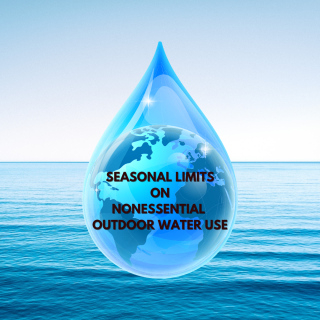Seasonal Limits on Nonessential Outdoor Water Use - Permit 9P4-2-20-177.01 as required by the Massachusetts Water Resources Management Program

Final WMA Permit 9P4-2-20-177.01
Seasonal Limits on Nonessential Outdoor Water Use
Permittee shall limit nonessential outdoor water use through mandatory restriction from May 1st through September 30 as outlined in Table 4 below.
Permittee shall be responsible for tracking streamflows and drought advisories and recording when restrictions are implemented in streamflow triggered restrictions are implemented. See Accessing Streamflow and Drought Advisory Website Information in Table 4 for instructions.
Permittee shall document compliance with the summer limits on nonessential outdoor water use annually in its Annual Statistical Report (ASR), and indicate whether it anticipates implementing calendar triggered restrictions or streamflow triggered restrictions during the next year.
Nothing in this permit shall prevent Permittee from implementing water use restrictions that are more restrictive than those set forth in this permit.
Water Use Restrictions
Nonessential outdoor water uses that are subject to mandatory restrictions include:
- Irrigation of lawns via sprinklers or automatic irrigation systems;
- washing of vehicles, except in a commercial car wash or as necessary for operator safety; and
- washing of exterior building surfaces, parking lots, driveway or sidewalks, except as necessary to apply surface treatments such as paint, preservatives, stucco, pavement or cement.
The following uses may be allowed when mandatory restrictions are in place:
- Irrigation to establish a new lawn and new plantings during the months of May and September.
- irrigation of public parks and recreational fields by means of automatic sprinklers outside the hours of 9 am to 5 pm; and
- irrigation of lawns, gardens, flowers, and ornamental plants by means of a hand-held hose.
Water uses NOT subject to mandatory restrictions are those required:
- for health or safety reasons;
- by regulation;
- for the production of food and fiber;
- for the maintenance of livestock; or
- to meet the core functions of a business (for example, irrigation by golf courses as necessary to maintain tees, greens and limited fairway watering or irrigation by plant nurseries as necessary to maintain stock).
| Attachment | Size |
|---|---|
| 1.9 MB |

